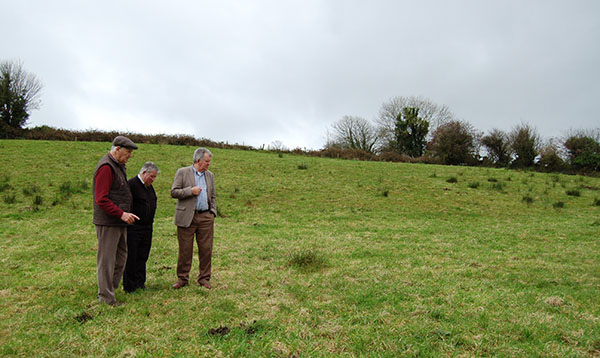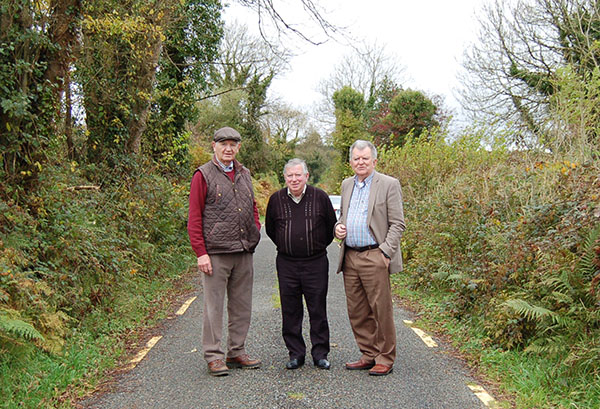Sylvester Poff, who with James Barrett was hanged on 23 January 1883 for the murder of Thomas Browne, was evicted from his farm at Mountnicholas, Co Kerry, in 1881. The dwelling house was demolished at the time of the eviction but the foundations remained.
About twenty years later, the farm was sold by the Encumbered Estates Court. It was purchased by Michael Marshall of Mountnicholas with funds earned in the United States and the assistance of his brother, Fr George Francis Marshall.[1]
Despite the change of hands, the land was always referred to as Poff’s Farm.
Michael Marshall’s grandson and namesake, in his recollections of the Marshalls of Mountnicholas, recalled how the stones of the Poff dwelling house were still visible in the late 1960s and ‘are probably not far under the surface even to this day.’[2]
The farm was always referred to by my grandfather and by the older locals as Poff’s Farm and he would not permit the foundations of the Poff dwelling house to be disturbed despite the fact that the section above ground was always a problem when mowing the hay in that particular field.

He also remarked on the jury at the two trials of Poff and Barrett:
It has always been accepted that the lead counsel for the prosecution, Lord Peter O’Brien of Kilfenora, more commonly known as Peter the Packer, ensured that prisoners in his court would be found guilty by arranging that the jury was packed with paid individuals who would be prepared to convict even on the most blatantly false and fabricated evidence.[3]
Mr Marshall, today General Manager of the Electrical Contractors Safety and Standards Association (ECSSA), observed how the identity of the killer or killers of Thomas Browne was known in the community because John Twiss, in his speech from the dock in 1895, declared:
Like Poff and Barrett, when I am dead and gone I am no loss at all … The two men that killed Poff and Barrett are over in the free land of America and whatever way they are over they can’t expect to be good or lucky.[4]

Michael Marshall, of the Riverville branch of the Marshall family, supports the cases for Presidential Pardons of John Twiss, Sylvester Poff and James Barrett. He considers the evidence for such pardons irrefutable and the delay in granting them inexcusable:
I would regard the evidence of innocence of Poff, Barrett and Twiss to be in fact stronger than that which brought about the pardon of Myles Joyce and therefore I cannot understand why three innocent men should still have such a miscarriage of justice visited on their names in an age where governments, on an ever increasing scale, are being forced to recognise and apologise for the many wrongs inflicted in the name of the state in our troubled past.[5]
The case for the Presidential Pardon of John Twiss was escalated by Minister Brendan Griffin’s announcement in Castleisland on Friday evening (18 October 2019) that the case will be sent for expert review forthwith.
The Michael O’Donohoe Project is finalising its application for the Presidential Pardons of Poff and Barrett.
________________
[1] See webpage ‘Remember Poff and Barrett’ (http://www.odonohoearchive.com/remember-poff-and-barrett/) for note on Fr George Francis Marshall. Michael Marshall, born in 1871, was the youngest of three sons (and six children) of Thomas Marshall of Mountnicholas and Julia McMahon of Killeens who married in 1858. Michael Marshall appears to have kept out of trouble by emigrating to the States where he served in the police force, possibly the mounted police. The third son of Thomas Marshall was Jeremiah, who married Anne, daughter of James McEllistrim of Ballybunion. The three daughters of Thomas and Julia were Mary, Margaret and Helen. Further reference, ‘The Marshall Family in County Kerry,’ held in IE MOD/C61. [2] Personal account of the Marshalls of Mountnicholas by Mike Marshall, Killarney, author of the poem, ‘Lest We Forget’ (2018), a tribute to John (Jack) Sullivan who fought in the Great War. A copy of this poem, the first line of which runs, ‘He sat beside the fire each day in a suit of shabby brown’, and which includes a note on the Ross Rifle, is held in IE MOD/C61. [3] Ibid. [4] Ibid. The speech of John Twiss can be read on the O’Donohoe website, ‘Death before Dishonour: John Twiss’s Speech from the Dock’ http://www.odonohoearchive.com/death-before-dishonour-john-twisss-speech-from-the-dock/ [5] Ibid. Michael Marshall’s branch of the Marshall family descends from George Marshall of Riverville House, Currans and his wife Margaret Walsh of Currans. Michael Marshall has prepared a comprehensive genealogical record of his family, ‘The Marshall Family in County Kerry,’ from the twelfth century to date (24 pages). A copy is held in IE MOD/C61. He has also kindly donated a copy of the Marshall pedigree from Tristram Marshall, who came to Kerry with Sir Charles Wilmot in 1602, also held in IE MOD/C61. In the eighteenth century, Riverville (townland of Urrohogal) was associated with Thomas Marshall Esq who married Avice into the Twiss family. The last member of the Marshall family recorded at Riverville was Richard Marshall Esq. In August 1834, his mother-in-law, Mrs Peet, relict of Ephraim Peet Esq formerly of Currens House, died at Riverville. Richard Marshall died at Riverville in June 1845 after falling down the stairs in the house. He was described as ‘friendly, benevolent and hospitable.’ His property descended to Mr Newton, nephew. The property was later associated with the Spring family (Bary, Houses of Kerry, p210). In 1848, John, son of Francis Spring Esq of Castlemaine, married Eva, eldest daughter of Richard Newton Esq of Wood Lodge, at Kiltallagh Church, Castlemaine. The Newton family was associated with Woodcock Lodge and Lickeen House Glencar.


